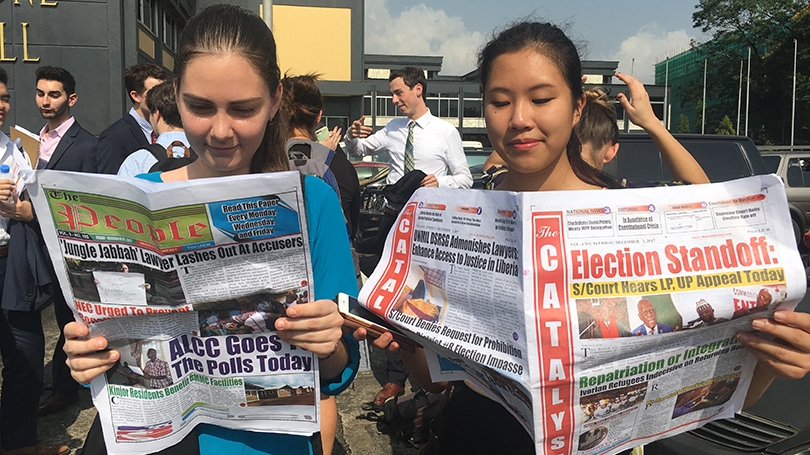
- About
- Consultation
- Programs
- Resources
- News & Events
Back to Top Nav
Back to Top Nav
Back to Top Nav
“Global Policy” class travels to West African nation to develop public policy proposal.
This is the first of a series of Dartmouth News stories about how some faculty and students are using the winter interim to enrich their Dartmouth experience.
As the Supreme Court of Liberia debated a challenge to the national election that represents the country’s first democratic handover of presidential power in three-quarters of a century, the students in Dartmouth’s Global Policy Leadership Practicum were taking notes in the upper gallery.
“With election tensions running high, ‘Public Policy 85’ students attended what is most likely one of the most important Supreme Court cases in Liberian history,” writes Allyssa Dobkins ’19 in a Dec. 5 dispatch from Liberia’s capital, Monrovia. “Two of the candidates in the October 10th election challenged the results, and the Supreme Court agreed to hear the case. The run-off election cannot go forward until this issue is resolved.”
The Nelson A. Rockefeller Center for Public Policy supports the program that Charles Wheelan ’88, a senior lecturer at the Rockefeller Center, developed at Dartmouth in 2012 to take advantage of the interim period between Thanksgiving and New Year’s. Class work runs during fall term and policy field work in the subject country runs over the two weeks of the interim. The students develop a working paper on real policy issues to be submitted to political and policy leaders in the host countries. In addition to Liberia, classes in past years have researched economic reform in India, the peace process in Northern Ireland, and the U.S. role in the Israeli-Palestinian conflict.
On Thursday in Monrovia, the court allowed the second-round runoff to proceed between Vice President Joseph Boakai of the ruling Unity Party and celebrity soccer player George Weah of the Coalition for Democratic Change party. The winner will succeed President Ellen Johnson Sirleaf, the first woman elected president of an African country (and the 2008 Dartmouth commencement speaker).
Reflecting on the decision, Connie Lee ’18 says, “I'm especially glad to see a ruling that allows Liberia to move forward with its democratic process. The Court is allowing the runoff vote to go ahead with the caveat that the National Elections Commission fix the first-round issues with voter identification and registration. In doing so, the Court has clarified the way forward for Liberia to see its first peaceful transition of power since 1944.”
Garrison Roe ’18 says the calm after the decision testifies to Liberia’s commitment to democracy. “It was so encouraging to see the entire nation engage with the political process and accept such a controversial decision. There were no disruptive riots or protests, and the majority of people seemed to respect the Court’s final authority. The Liberian people’s response to this decision reflects how seriously they take continued peacekeeping efforts.”
Wheelan says experiencing the political and social environment of a country first hand brings greater depth to the students’ understanding. “We were following the election in class all fall, but it felt relatively abstract. Now we have a feel for the various candidates and their bases of support,” he says.
Wheelan taps Dartmouth connections around the globe to facilitate student meetings with politicians, academics, civil society leaders, journalists, business leaders, diplomats, and other experts who help inform the students’ policy analysis. The group must work together to formulate a policy memo with actionable recommendations for political and other policy leaders in the country.
“This travel not only deepens the students’ understanding of the policy issues, but also builds on leadership and communication skills through direct contact with policymakers and other leaders abroad,” he says.

Since arriving in Liberia on Sept.29, the group has met with U.S Ambassador Christine Elder in Monrovia, who briefed the class on the current situation on the ground; Nick Jahr, an election observer for the Carter Center; Patrice Juah, a 2014 Dartmouth YALI Fellow and former Miss Liberia who is an internationally known advocate for girls’ education; and Leymah Gbowee, a Liberian activist and Nobel Peace Prize winner who delivered Dartmouth’s commencement address in 2016.
Gbowee, who is the parent of a Dartmouth student, invited Wheelan’s class to a political discussion with leaders of Liberia’s women’s movement on the intersection of women in politics and social media.
“Afterward she invited us to have dinner with her, along with her husband and activist friends. At dinner, she discussed her memoir, her son at Dartmouth, and the political impacts of tribal affiliations in Liberia,” says Savannah Moss ’18. “Gbowee was one of the most resilient and insightful people I have ever met.”
Gbowee’s memoir, Mighty Be Our Powers: How Sisterhood, Prayer, and Sex Changed a Nation at War, tells the story of how the women’s movement made possible the democratic election in 2005 of Johnson Sirleaf, a Nobel Peace Prize laureate, marking the end of decades of civil war and corruption under President Charles Taylor. Economic reform, monetary stabilization, establishment of democratic institutions, and coping with public health crises following an Ebola outbreak in 2014 have created significant challenges to stable economic and political development, says Wheelan.
Tackling these difficult policy questions and hearing from a wide spectrum of people who care deeply about their country has been an invaluable experience, he says.
“We had no idea we would get to see the Supreme Court hearing. Nor did we think we would have dinner with Leymah Gbowee. But when you go to an interesting place with a passion to understand it better, these are the kinds of things that can happen.”

Bill Platt can be reached at william.c.platt@dartmouth.edu.